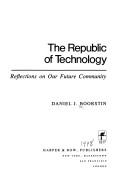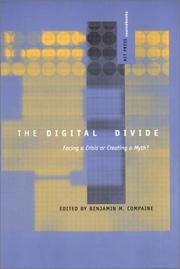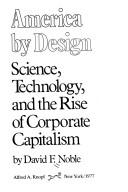| Listing 1 - 10 of 16 | << page >> |
Sort by
|
Book
Year: 1997 Publisher: New York ; Oxford Oxford University Press
Abstract | Keywords | Export | Availability | Bookmark
 Loading...
Loading...Choose an application
- Reference Manager
- EndNote
- RefWorks (Direct export to RefWorks)

ISBN: 0060104287 9780060104283 Year: 1978 Publisher: New York Harper & Row
Abstract | Keywords | Export | Availability | Bookmark
 Loading...
Loading...Choose an application
- Reference Manager
- EndNote
- RefWorks (Direct export to RefWorks)
Civilisation --- Technology --- Social aspects --- United States --- Intellectual life --- Technology - Social aspects - United States --- United States - Intellectual life
Book
ISBN: 9780262529860 0262529866 Year: 2016 Publisher: Cambridge, MA : The MIT Press,
Abstract | Keywords | Export | Availability | Bookmark
 Loading...
Loading...Choose an application
- Reference Manager
- EndNote
- RefWorks (Direct export to RefWorks)
With Obfuscation, Finn Brunton and Helen Nissenbaum mean to start a revolution. They are calling us not to the barricades but to our computers, offering us ways to fight today’s pervasive digital surveillance—the collection of our data by governments, corporations, advertisers, and hackers. To the toolkit of privacy protecting techniques and projects, they propose adding obfuscation: the deliberate use of ambiguous, confusing, or misleading information to interfere with surveillance and data collection projects. Brunton and Nissenbaum provide tools and a rationale for evasion, noncompliance, refusal, even sabotage—especially for average users, those of us not in a position to opt out or exert control over data about ourselves. Obfuscation will teach users to push back, software developers to keep their user data safe, and policy makers to gather data without misusing it.Brunton and Nissenbaum present a guide to the forms and formats that obfuscation has taken and explain how to craft its implementation to suit the goal and the adversary. They describe a series of historical and contemporary examples, including radar chaff deployed by World War II pilots, Twitter bots that hobbled the social media strategy of popular protest movements, and software that can camouflage users’ search queries and stymie online advertising. They go on to consider obfuscation in more general terms, discussing why obfuscation is necessary, whether it is justified, how it works, and how it can be integrated with other privacy practices and technologies.

ISBN: 0262531933 9780262287029 0262287021 0585386633 9780585386638 9780262531931 0262032872 9780262032872 1282100254 9786612100253 Year: 2001 Publisher: Cambridge, Mass. MIT
Abstract | Keywords | Export | Availability | Bookmark
 Loading...
Loading...Choose an application
- Reference Manager
- EndNote
- RefWorks (Direct export to RefWorks)
Annotation The Digital Divide refers to the perceived gap between those who have access to the latest information technologies and those who do not. If we are indeed in an Information Age, then not having access to this information is an economic and social handicap. Some people consider the Digital Divide to be a national crisis, while others consider it an over-hyped nonissue. This book presents data supporting the existence of such a divide in the 1990s along racial, economic, ethnic, and education lines. But it also presents evidence that by 2000 the gaps are rapidly closing without substantive public policy initiatives and spending. Together, the contributions serve as a sourcebook on this controversial issue.
Social change --- Computer. Automation --- Social problems --- United States --- #SBIB:309H103 --- Mediatechnologie / ICT / digitale media: sociale en culturele aspecten --- Digital divide --- Information technology --- Social aspects --- Digital divide - United States. --- Information technology - Social aspects - United States. --- United States of America
Book
ISBN: 9780674983700 067498370X Year: 2019 Publisher: Cambridge (Mass.) : Harvard university press,
Abstract | Keywords | Export | Availability | Bookmark
 Loading...
Loading...Choose an application
- Reference Manager
- EndNote
- RefWorks (Direct export to RefWorks)
Do our digital habits kill our attention span or alter the nature of focus? Is social media driving us apart or changing the meaning of social relationships? How we answer these questions will hinge on what we value. This wide-ranging account of our emotional responses to new technologies, from the telegraph to the smart phone, argues that we are profoundly changed by them. Today, for example, we are increasingly distrustful of social media, yet we have a hard time separating ourselves from the technologies we don't trust. It turns out this is not new: Bored, Lonely, Angry, Stupid reveals how past technological innovations aroused intense feelings and altered our sense of self.--
Technology --- Technological innovations --- Social aspects --- Psychological aspects --- Psychological aspects. --- Social aspects. --- United States. --- Technology - Social aspects - United States --- Technology - United States - Psychological aspects --- Technological innovations - Social aspects - United States --- Technological innovations - United States - Psychological aspects
Book
ISBN: 9780226626581 9780226626444 9780226626611 022662658X 022662661X Year: 2019 Publisher: Chicago, Ill. The University of Chicago Press
Abstract | Keywords | Export | Availability | Bookmark
 Loading...
Loading...Choose an application
- Reference Manager
- EndNote
- RefWorks (Direct export to RefWorks)
We are now acutely aware, as if all of the sudden, that data matters enormously to how we live. How did information come to be so integral to what we can do? How did we become people who effortlessly present our lives in social media profiles and who are meticulously recorded in state surveillance dossiers and online marketing databases? What is the story behind data coming to matter so much to who we are? In How We Became Our Data, Colin Koopman excavates early moments of our rapidly accelerating data-tracking technologies and their consequences for how we think of and express our selfhood today. Koopman explores the emergence of mass-scale record keeping systems like birth certificates and social security numbers, as well as new data techniques for categorizing personality traits, measuring intelligence, and even racializing subjects. This all culminates in what Koopman calls the "informational person" and the "informational power" we are now subject to. The recent explosion of digital technologies that are turning us into a series of algorithmic data points is shown to have a deeper and more turbulent past than we commonly think. Blending philosophy, history, political theory, and media theory in conversation with thinkers like Michel Foucault, Jürgen Habermas, and Friedrich Kittler, Koopman presents an illuminating perspective on how we have come to think of our personhood-and how we can resist its erosion.
Information science --- Information society --- Information technology --- Social aspects --- Psychological aspects --- Political philosophy. Social philosophy --- Philosophical anthropology --- General ethics --- Mass communications --- Information systems --- Information science - Social aspects - United States --- Information society - United States - Psychological aspects --- Information technology - Social aspects - United States --- Psychological aspects. --- Algorithms. --- Critical Theory. --- Data. --- Formats. --- Genealogy. --- Infopower. --- Information Politics. --- Information. --- Informational Persons. --- Subjectivity.
Book
ISBN: 152921534X 1529215315 1529215323 1529215331 9781529215311 9781529215328 9781529215335 Year: 2021 Publisher: Bristol Bristol University Press
Abstract | Keywords | Export | Availability | Bookmark
 Loading...
Loading...Choose an application
- Reference Manager
- EndNote
- RefWorks (Direct export to RefWorks)
This book is a timely analysis of the growing impact of digital technologies on populism in the US and beyond. Scott Timcke uses Marxist analysis to explore the way digital devices, social networks, data and algorithms, and the technology giants that lie behind them, are changing the way people think about politics and society.
Information technology --- Algorithms --- Social aspects --- History --- Political aspects. --- Social aspects. --- Algorism --- Algebra --- Arithmetic --- IT (Information technology) --- Technology --- Telematics --- Information superhighway --- Knowledge management --- Foundations --- Information technology - Social aspects - United States --- Information technology - Social aspects --- Information technology - History - 21st century --- Algorithms - Political aspects --- Algorithms - Social aspects --- Social media --- Populism --- Economic sociology --- Political systems --- Artificial intelligence. Robotics. Simulation. Graphics --- United States of America
Book
ISBN: 9780804752367 9780804752374 9780804772891 0804772894 0804752362 0804752370 Year: 2010 Publisher: Stanford, Calif. Stanford University Press
Abstract | Keywords | Export | Availability | Bookmark
 Loading...
Loading...Choose an application
- Reference Manager
- EndNote
- RefWorks (Direct export to RefWorks)
As use of information technology increases, we worry that our personal information is being shared inappropriately, violating key social norms and irreversibly eroding privacy. This book describes how societies ought to go about deciding when to allow technology to lead change and when to resist it in the name of privacy.
Human rights --- Computer. Automation --- Privacy, Right of --- Information technology --- Information policy --- Social norms --- Social aspects --- Social norms. --- Droit à la vie privée --- Technologie de l'information --- Information --- Normes sociales --- Aspect social --- Politique gouvernementale --- Droit à la vie privée --- Folkways --- Norms, Social --- Rules, Social --- Social rules --- Manners and customs --- Social control --- Privacy, Right of - United States --- Information technology - Social aspects - United States --- Information policy - United States

ISBN: 0394499832 9780394499833 Year: 1977 Publisher: New York
Abstract | Keywords | Export | Availability | Bookmark
 Loading...
Loading...Choose an application
- Reference Manager
- EndNote
- RefWorks (Direct export to RefWorks)
Sociology of knowledge --- Economic sociology --- United States --- Technology --- Capitalism --- Science and industry --- Social aspects --- History --- -Production (Economic theory) --- -Technology --- -Applied science --- Arts, Useful --- Science, Applied --- Useful arts --- Science --- Industrial arts --- Material culture --- Industry and science --- Industries --- Microeconomics --- Supply and demand --- Demand (Economic theory) --- Supply-side economics --- Market economy --- Economics --- Profit --- Capital --- -United States --- History. --- -Social aspects --- -Microeconomics --- Applied science --- Production (Economic theory) --- Technology - Social aspects - United States --- Capitalism - United States --- Science and industry - United States --- United States - History --- United States of America
Book
ISBN: 9781509526390 9781509526406 9781509526437 1509526390 1509526439 1509526404 Year: 2020 Publisher: Cambridge Polity
Abstract | Keywords | Export | Availability | Bookmark
 Loading...
Loading...Choose an application
- Reference Manager
- EndNote
- RefWorks (Direct export to RefWorks)
"Cutting through tech-industry hype, this book explores how emerging technologies reinforce white supremacy. Conceptualizing the "New Jim Code," Benjamin shows how discriminatory designs can encode inequity and also makes a case for race itself as a kind of tool designed to stratify and sanctify social injustice"-- "From everyday apps to complex algorithms, Ruha Benjamin cuts through tech-industry hype to understand how emerging technologies can reinforce white supremacy and deepen social inequity. Far from a sinister story of racist programmers scheming on the dark web, Benjamin argues that automation has the potential to hide, speed, and even deepen discrimination, while appearing neutral and even benevolent when compared to racism of a previous era. Presenting the concept of the “New Jim Code,” she shows how a range of discriminatory designs encode inequity: by explicitly amplifying racial hierarchies, by ignoring but thereby replicating social divisions, or by aiming to fix racial bias but ultimately doing quite the opposite. Moreover, she makes a compelling case for race itself as a kind of tool – a technology designed to stratify and sanctify social injustice that is part of the architecture of everyday life. This illuminating guide into the world of biased bots, altruistic algorithms, and their many entanglements provides conceptual tools to decode tech promises with sociologically informed skepticism. In doing so, it challenges us to question not only the technologies we are sold, but also the ones we manufacture ourselves"--
Social problems --- Artificial intelligence. Robotics. Simulation. Graphics --- Digital divide --- Information technology --- African Americans --- Whites --- United States --- Social aspects --- Social conditions --- Race relations --- Sociology of minorities --- racial discrimination --- algorithms --- algoritmen --- SOCIAL SCIENCE / Demography. --- Digital divide - United States - 21st century --- Information technology - Social aspects - United States - 21st century --- African Americans - Social conditions - 21st century --- Whites - United States - Social conditions - 21st century --- United States - Race relations - 21st century
| Listing 1 - 10 of 16 | << page >> |
Sort by
|

 Search
Search Feedback
Feedback About UniCat
About UniCat  Help
Help News
News